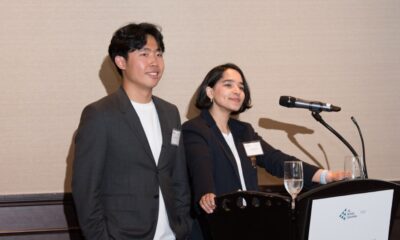Business
Families Propose Home-Schooling Solutions to Alleviate Class Sizes

A group of families has put forward a proposal advocating for increased home-schooling options as a solution to overcrowded classrooms. In a letter published on November 1, 2025, Elaine Burns suggests that families who consistently home-school their children should receive an education allowance equivalent to the cost of public schooling. This initiative aims to provide flexibility and reduce the pressure on traditional educational institutions.
To ensure that home-schooled students are adhering to approved curricula, Burns proposes the implementation of supervised examinations administered by independent educators. These assessments could be conducted in community facilities, such as local halls or libraries, allowing for a structured approach to home education. The initiative aims to offer families greater educational choices while addressing the growing issue of class sizes in public schools.
Burns emphasizes the availability of online resources that facilitate curriculum-based teaching at home. She believes that the socialization aspects typically found in traditional schools can be partially fulfilled through participation in local youth organizations or church groups. Programs offered by organizations such as the Boys & Girls Scouts are highlighted as valuable alternatives to conventional schooling environments.
In a separate letter, Greg Parchello raises concerns regarding the financial management of public projects, referencing the Eglinton LRT Crosstown project in Ontario. He notes that the current projected cost of the partially completed 19-kilometer light-rail line is approximately $13.08 billion, which includes three decades of maintenance costs. This figure represents a staggering $8 billion increase over initial estimates made when construction began in 2011, with completion now pushed back to 2030 instead of the originally planned 2020 date.
Donald K. Munroe expresses frustration with the Canadian government’s clean energy policies, particularly criticizing Prime Minister Justin Trudeau’s global travel habits. Munroe points out the contradiction between advocating for green energy and the use of fossil fuel-dependent transportation for international meetings. He questions the effectiveness of Canada’s commitment to a green transition while high-profile officials continue to rely on traditional energy sources.
Meanwhile, Aaron Williamson expresses discontent with Ontario Premier Doug Ford’s remarks concerning U.S. tariffs. Williamson argues that Ford’s statements, which appear to diminish the impact of tariffs, could jeopardize Canada-U.S. relations. He emphasizes that many Canadians did not elect Ford and do not support his approach, which he believes may have negative repercussions for the country.
In a more humanitarian note, Paul Bacon extends thoughts and prayers to the people of Jamaica as they recover from Hurricane Melissa. He acknowledges the critical role played by first responders and community members in providing support during this challenging time.
As discussions about education, public spending, and international relations continue, the diverse perspectives shared in these letters underscore the complexities faced by Canadian citizens in navigating modern challenges.
-

 World4 months ago
World4 months agoScientists Unearth Ancient Antarctic Ice to Unlock Climate Secrets
-

 Entertainment4 months ago
Entertainment4 months agoTrump and McCormick to Announce $70 Billion Energy Investments
-

 Lifestyle4 months ago
Lifestyle4 months agoTransLink Launches Food Truck Program to Boost Revenue in Vancouver
-

 Science4 months ago
Science4 months agoFour Astronauts Return to Earth After International Space Station Mission
-

 Technology2 months ago
Technology2 months agoApple Notes Enhances Functionality with Markdown Support in macOS 26
-

 Top Stories3 weeks ago
Top Stories3 weeks agoUrgent Update: Fatal Crash on Highway 99 Claims Life of Pitt Meadows Man
-

 Sports4 months ago
Sports4 months agoSearch Underway for Missing Hunter Amid Hokkaido Bear Emergency
-

 Politics3 months ago
Politics3 months agoUkrainian Tennis Star Elina Svitolina Faces Death Threats Online
-

 Politics4 months ago
Politics4 months agoCarney Engages First Nations Leaders at Development Law Summit
-

 Technology4 months ago
Technology4 months agoFrosthaven Launches Early Access on July 31, 2025
-

 Top Stories1 week ago
Top Stories1 week agoFamily Remembers Beverley Rowbotham 25 Years After Murder
-

 Entertainment4 months ago
Entertainment4 months agoCalgary Theatre Troupe Revives Magic at Winnipeg Fringe Festival


















